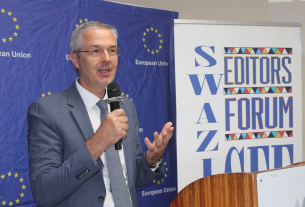By Mbono Mdluli
MBABANE – Achieving food sovereignty is a collective responsibility for all citizens of Eswatini.
Government Spokesperson Alpheous Nxumalo emphasized this point in response to His Majesty King Mswati III’s address on January 4, 2025, during the dispersal of Emabutfo at the Ngabezweni Royal Residence.

In his first public address of the year, the King highlighted critical national values such as unity, respect, cultural preservation, perseverance, and the pursuit of food sovereignty. Building on the King’s directives from the 2023 Sibaya, Nxumalo reiterated that the government is committed to ensuring food sovereignty while addressing unemployment.
“The King has challenged us to think beyond conventional solutions and take individual responsibility to solve the nation’s challenges together,” Nxumalo stated in an interview with Eswatini TV.
Nxumalo urged citizens to move away from the mindset of relying solely on the government to alleviate issues like food insecurity and unemployment. “It’s easy for some to think that the government will produce food and create jobs for them. However, this is a shared task that requires everyone to contribute,” he said.
He further encouraged Emaswati to engage in productive activities, warning that inaction perpetuates hunger. Additionally, he emphasized the importance of creating employment opportunities, urging citizens to explore entrepreneurship as a means to not only sustain themselves but also to provide jobs for others.

Minister of Agriculture Mandla Tshawuka has frequently stressed that the country’s goal is not only to achieve food security but also food sovereignty. While food security focuses on ensuring access to adequate, safe, and nutritious food, food sovereignty takes this a step further by prioritizing sustainable agriculture, local food systems, and community empowerment.
According to Change for Children, food sovereignty aims to address systemic power imbalances by advocating for:
- Democratic participation in food systems by citizens and producers
- Ecological sustainability in food production, distribution, and consumption
- Social and economic justice
- Land reforms and secure tenure for small-scale farmers
- Rights for peasants, women, indigenous peoples, and workers
Climate justice
Unlike food security, which does not consider the origins or conditions of food production, food sovereignty promotes ethical and sustainable practices. It challenges systems that exploit the environment and local producers for the benefit of large agribusiness corporations.
Nxumalo’s call for collective action highlights the urgency of embracing food sovereignty as a national mission. As the country moves forward, active participation from every citizen will be crucial in ensuring Eswatini’s sustainable future.








